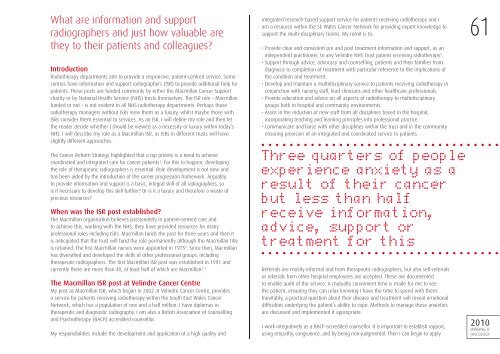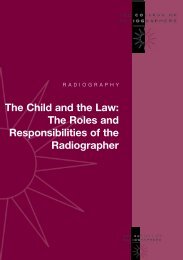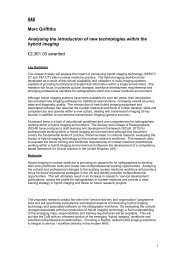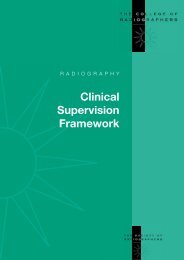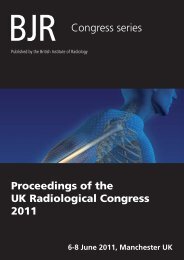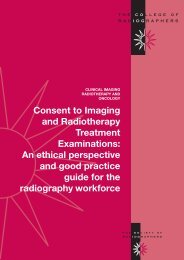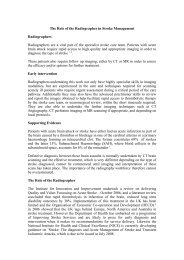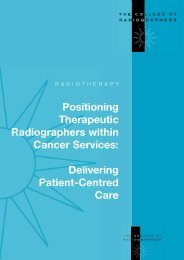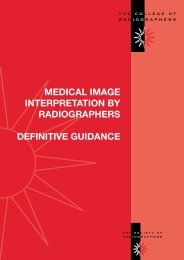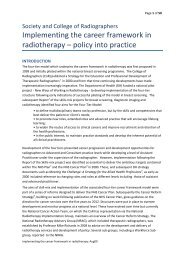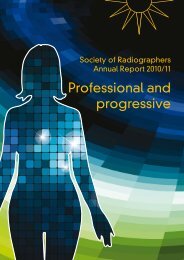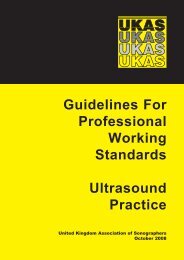IMAGING & ONCOLOGY - Society of Radiographers
IMAGING & ONCOLOGY - Society of Radiographers
IMAGING & ONCOLOGY - Society of Radiographers
- No tags were found...
You also want an ePaper? Increase the reach of your titles
YUMPU automatically turns print PDFs into web optimized ePapers that Google loves.
What are information and supportradiographers and just how valuable arethey to their patients and colleagues?IntroductionRadiotherapy departments aim to provide a responsive, patient-centred service. Somecentres have information and support radiographers (ISR) to provide additional help forpatients. These posts are funded commonly by either the Macmillan Cancer Supportcharity or by National Health Service (NHS) trusts themselves. The ISR role – Macmillanfunded or not – is not evident in all NHS radiotherapy departments. Perhaps thoseradiotherapy managers without ISRs view them as a luxury, whilst maybe those withISRs consider them essential to services. As an ISR, I will defi ne my role and then letthe reader decide whether I should be viewed as a necessity or luxury within today’sNHS. I will describe my role as a Macmillan ISR, as ISRs in different trusts will haveslightly different approaches.The Cancer Reform Strategy highlighted that a top priority is a need to achievecoordinated and integrated care for cancer patients¹. For this to happen, developingthe role <strong>of</strong> therapeutic radiographers is essential. Role development is not new andhas been aided by the introduction <strong>of</strong> the career progression framework. Arguably,to provide information and support is a basic, integral skill <strong>of</strong> all radiographers, sois it necessary to develop this skill further? Or is it a luxury and therefore a waste <strong>of</strong>precious resources?When was the ISR post established?The Macmillan organisation believes passionately in patient-centred care andto achieve this, working with the NHS, they have provided resources for manypr<strong>of</strong>essional roles including ISRs. Macmillan funds the post for three years and then itis anticipated that the trust will fund the role permanently although the Macmillan titleis retained. The fi rst Macmillan nurses were appointed in 1975 2 . Since then, Macmillanhas diversifi ed and developed the skills <strong>of</strong> other pr<strong>of</strong>essional groups, includingtherapeutic radiographers. The fi rst Macmillan ISR post was established in 1991 andcurrently there are more than 40, at least half <strong>of</strong> which are Macmillan 3, 4 .The Macmillan ISR post at Velindre Cancer CentreMy post as Macmillan ISR, which began in 2002 at Velindre Cancer Centre, providesa service for patients receiving radiotherapy within the South East Wales CancerNetwork, which has a population <strong>of</strong> one and a half million. I have diplomas intherapeutic and diagnostic radiography. I am also a British Association <strong>of</strong> Counsellingand Psychotherapy (BACP) accredited counsellor.My responsibilities include the development and application <strong>of</strong> a high quality andintegrated research-based support service for patients receiving radiotherapy and Iam a resource within the SE Wales Cancer Network for providing expert knowledge tosupport the multi-disciplinary teams. My remit is to:• Provide clear and consistent pre and post treatment information and support, as anindependent practitioner, to any Velindre NHS Trust patient receiving radiotherapy 5 .• Support through advice, advocacy and counselling, patients and their families fromdiagnosis to completion <strong>of</strong> treatment with particular reference to the implications <strong>of</strong>the condition and treatment.• Develop and maintain a multidisciplinary service to patients receiving radiotherapy inconjunction with nursing staff, lead clinicians and other healthcare pr<strong>of</strong>essionals.• Provide education and advice on all aspects <strong>of</strong> radiotherapy to multidisciplinarygroups both in hospital and community environments.• Assist in the induction <strong>of</strong> new staff from all disciplines based in the hospital,incorporating teaching and learning principles into pr<strong>of</strong>essional practice.• Communicate and liaise with other disciplines within the trust and in the communityensuring provision <strong>of</strong> an integrated and coordinated service to patients.Three quarters <strong>of</strong> peopleexperience anxiety as aresult <strong>of</strong> their cancerbut less than halfreceive information,advice, support ortreatment for thisReferrals are mostly informal and from therapeutic radiographers, but also self-referralsor referrals from other hospital employees are accepted. These are documentedto enable audit <strong>of</strong> the service. A mutually convenient time is made for me to seethe patient, ensuring they can relax knowing I have the time to spend with them.Inevitably, a practical question about their disease and treatment will reveal emotionaldiffi culties underlying the patient’s ability to cope. Methods to manage these anxietiesare discussed and implemented if appropriate.I work integratively as a BACP accredited counsellor. It is important to establish rapport,using empathy, congruence, and by being non-judgmental. Then I can begin to apply612010<strong>IMAGING</strong> &<strong>ONCOLOGY</strong>


